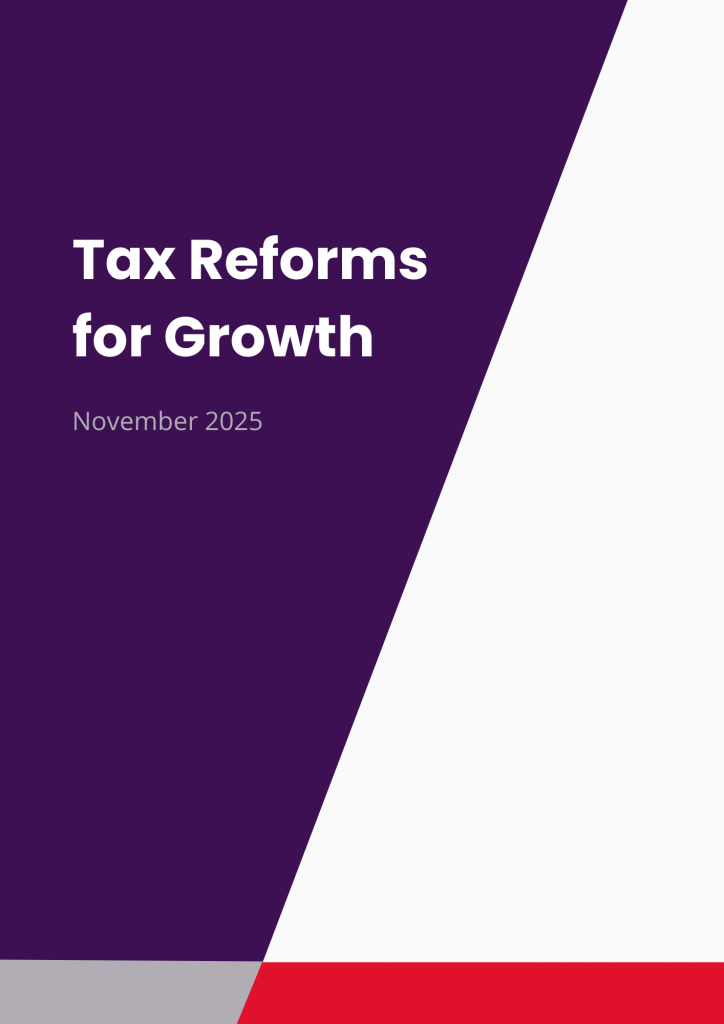
Tax Reforms for Growth
By Andy Summers, Arun Advani, Carsten Jung, Chris Belfield, Dan Neidle, Hannah Peaker, James Howat, James Lawson, Robert Colvile and Ryan Shorthouse
The Government has stated that economic growth is its overwhelming priority. One of the main barriers to growth is the tax system, which contains many arbitrary and nonsensical rules.
This document – authored by experts from think tanks across the political spectrum – provides a set of packages that would move the UK towards a fairer, more effective and more pro-growth tax system. This is a framework for the direction of reform, not a precise blueprint.
Tax Reforms for Growth
Package 1: Reform property taxes
Problem
The UK’s property taxes are outdated and distortive. Stamp Duty on land is one of the most distortive taxes in the UK. Business Rates do not encourage the most efficient use of land, while Council Tax is based on house values from 1991.
Policy package
- Abolish Stamp Duty Land Tax.
- Base Business Rates on site values and remove empty property relief.
- Base Council Tax on current house values (with regular revaluation).
Revenue neutrality
This would be achieved by adjustments to some combination of Business Rates and Council Tax, to pay for the abolition of Stamp Duty on land.
Package 2: Lower VAT and broaden the VAT base
Problem
When applied to a broad base of consumption, VAT can be an efficient way of raising revenue. However, the UK’s VAT is levied on just half of all spending.
Policy package
- Broaden the VAT base to include more types of spending.
- Lower the headline rate.
- Compensate lower income groups for higher costs on basic goods.
Revenue neutrality
Revenue raised by broadening the VAT base could be given back through a combination of a lower headline rate and targeted compensation for lower income groups.
Package 3: Address marginal Income Tax rates
Problem
The UK Income Tax and benefits system often punishes people for working more. This applies across the income scale, for example the withdrawal of childcare subsidies at £100,000, the High-Income Child Benefit Charge, and the taper rate for people coming off Universal Credit.
Policy package
- Reduce the marginal rate that applies to the removal of childcare subsidies.
- Introduce a more gradual taper for the removal of child benefit.
- Ensure that marginal rates on the low-paid or those coming off benefits are as low as possible.
Revenue neutrality
To ensure the policy is revenue neutral, options include:
- Raise the Higher and/or Additional Rates.
- Lower the Higher and/or Additional Rate threshold.
Package 4: Tax all income from work equally
Problem
There is very little relationship between how much someone pays in National Insurance Contributions (NICs) and what they get out from the system. In reality, NICs are simply a tax on employment income. However, NICs are applied differently across different types of work, and do not apply to all workers. It is also not transparent that the burden of employer NICs generally falls on the employee.
Policy package
- Merge employer and employee NICs with Income Tax, as proposed by the Mirrlees Review.[1]
Revenue neutrality
Adjust Income Tax rates to achieve revenue neutrality.
Package 5: Tax landlords on profits as other income
Problem
Landlords currently pay tax partly on revenue rather than profit, since they cannot fully deduct mortgage interest costs. This distorts the choice of whether to hold property directly or through a corporate structure. They also do not face any equivalent of NICs on their rental income.
Policy package
- Allow a full deduction for mortgage interest costs, or equivalent allowance for the cost of borrowing.
- Top up to account for NICs.
Revenue neutrality
This would be through adjusting headline Income Tax rates in whichever direction is appropriate.
Package 6: Do not distort incentives to invest in assets which grow in value
Problem
Investors currently face the same tax on capital gains whether the cost of borrowing to invest is high or low. This means that otherwise profitable (pre-tax) investments can become unprofitable post-tax when interest rates are high, reducing investment and ultimately growth. The implied tax debt on accrued gains is wiped out on death, encouraging people to continue to inefficiently hold assets which have large gains to benefit from the gain being rebased. Departure from the UK is another way to escape Capital Gains Tax (CGT), encouraging people who have built large businesses to leave before they sell, meaning future businesses are less likely to be built here.
Policy package
- Introduce an ‘investment allowance’ for capital gains.
- Introduce a carryover basis at death: the inheritor gets the asset and the base cost.
- Tax all gains accrued in the UK and only those gains. This means rebasing gains on arrival to the UK and treating departure as a deemed disposal (as in Canada, Australia and the U.S.). This does not necessarily mean payment is due on departure.
Revenue neutrality
Headline CGT rates should be adjusted in whichever direction is appropriate for revenue neutrality.
Package 7: Reform Corporation Tax
Problem
The UK’s Corporation Tax system offers full expensing for some types of capital expenditure and not others. However, businesses are best placed to determine what capital spending will make their business most profitable, and the different treatment of capital spending affects their decision making in sub-optimal ways.
Policy package
- Give upfront tax relief for all business expenditure and end the capital/income distinction in tax law.
- Look to end the bias towards debt over equity investment.
- Remove limits on loss deductions, with appropriate safeguards against abuse.
Revenue neutrality
Adjust headline Corporation Tax rates to make this revenue neutral.
[1] Mirrlees, J. et al. 2011. ‘Tax by design’.

